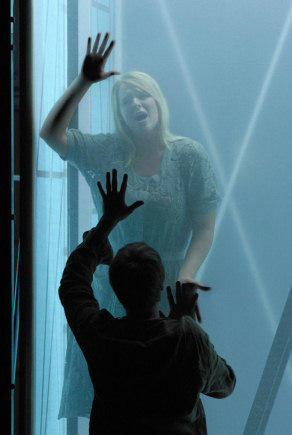Other Links
Editorial Board
-
Editor - Bill Kenny
-
Deputy Editor - Bob Briggs
Founder - Len Mullenger
Google Site Search
SEEN
AND HEARD INTERNATIONAL OPERA REVIEW
Haydn, L’Infedeltà Delusa – ‘Deceit Outwitted’ :
Soloists, Orchestra Le Cercle de l’Harmonie,
Conductor: Jérémie Rhorer, Teatro Arriaga
de Bilbao 8. 2.2009 (JMI)
Production: Académie Européenne de Musicque, Festival
d’Aix-en-Provence, Opera de Toulon, Grand Théâtre de
Luxembourg, Opera Lille and Musikfest Bremen,
Director: Richard Brunel
Sets: Anouk Dell’Aeira
Costumes: Marianne Delayre
Lighting: David Debrinay
Cast:
Sandrina: Ina Kringelborn
Vespina: Eduarda Melo
Filippo: Iain Paton
Nencio: Julián Pregardien
Nanni: Thomas Tatzl

Picture - courtesy of Teatro Arriaga, Bilbao
Amongst the dozen operas that he wrote, a large part
is made up of opera buffa in the Italian style
which was so popular during the second half of the 18th
century. None of them are in the repertoire of major
houses at the moment. Other more serious operas have
had better fortune, particularly Armida
(revived in Salzburg in 2007), L' Anima del
Filosofo (a vehicle for a brilliant Cecilia
Bartoli in 2001) and Orlando Paladino (revived
successfully in Vienna at the end of 2007). The rest
of his operas, including this L' Infedeltà Delusa,
have had occasional revivals, but have soon fallen
again into oblivion.
The plot of L’infedelta Delusa is
typically complex and
tends, appropriately, towards the absurd. A father,
Fillipo, has a beautiful daughter he intends to marry
to a rich man, Nencio. The daughter, Sandrina, loves
Nanni the brother of Vespina. Vespina,
naturally enough, loves Nencio.
Sandrina is obliged
to obey her father and lets Nanni know that all is
lost, which inspires his sister
to embark on a series of disguises in which she
impersonates variously an old woman who says that
Nencio has abandoned her daughter (thus making
Fillipo refuse to allow his daughter to marry him), a
servant, a marquis and a notary.
Eventually, all four are married, each to the
right person, by Vespina’s deception.
The production at the Teatro Arriaga was premiered
last July at the Aix-en-Provence Festival in the
small outdoor space of the Hôtel Maynier d' Oppède,
with director Richard Brunel amply fulfilling the
task of offering this “musical burletta”, as Haydn
called it. The sets were conceived for a very small
stage, to the point that the action often takes place
in the vertical, and this left quite a lot of empty
space on the stage at the Teatro Arriaga. The opera
arrived already well rehearsed, with a cast of young
people who have been on a tour through different
cities in Spain.
The Orchestra Le Cercle de L' Harmonie was conducted
by Jérémie Rhorer. This young conductor handled the
burletta with very suitable tempos, and at the
same time was aware of the needs of the young singers
on stage, supporting them well.
As I said, the casting was a vehicle for young
singers and the best performance came from the
Portuguese soprano Eduarda Melo, who was an excellent
interpreter of Vespina, the heroine of the opera, a
kind of Despina who moves the action along amidst
ever-changing disguises. She is a good actress and a
decent singer. Sandrina
was played by the Norwegian Ina Kringelborn, the only
survivor of the original cast. She looked very
convincing, but her vocal qualities were somewhat
limited for the part.
Scottish tenor Iain Paton was too young to convince
as Filippo (Sandrina’s father) and was vocally still
immature. Another
young tenor Julian Pregardien (24 years old) was not
up to playing Nencio, and encountered serious
problems at times. Thomas
Tatzl played Nanni, the object of Sandrina’s love and
suffered from uncertain pitch.
The theatre was half empty. At the final bows the
public applauded all the artists with some warmth but
not much enthusiasm.
José M Irurzun
Back
to Top
Cumulative Index Page
